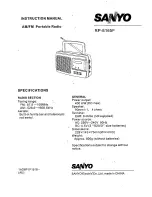
100430 - 6500W ELECTRIC START GENERATOR
IMPORTANT SAFETY INSTRUCTIONS
7
Safety Lifting Instructions
WARNING
Damage to the generator as a result of failing to follow these
instructions will void your warranty and could result in damage
to property; and/or cause serious injury or death.
–
Lifting equipment should always be positioned to reduce
the risk of load drifting, striking a person, falling freely or
being unintentionally released.
–
Always use lifting equipment on a flat level surface when
lifting the generator.
–
Failure to properly connect lifting cables, chains, or straps
could result in damage to property, the generator and/or
cause serious injury or death.
–
Always use cables, chains or straps rated at 2000 lbs.
(907 kg) working load or greater to raise or suspend the
generator.
–
Always remove twists in cables, chains or straps before
connecting.
–
Never use cables, chains or straps with cracks, breaks,
nicks, tears, cuts, holes, stretched links or fittings or show
excessive wear.
–
Always inspect that the lifting hook fasteners are secured
and tightened before use.
–
Always inspect lifting hook for cracks, corrosion or other
damage before use.
–
Never use a damaged or cracked lifting hook. If damaged,
call our Technical Support Team for assistance at
1-877-338-0999 for an authorized replacement lifting
hook.
–
Never operate the generator while suspended or use the
lifting hook other than as directed.
DANGER
Never position yourself underneath the generator when lifting
or moving the load. Failure to do so could result in serious
injury or death.
Always keep bystanders, children and pets at least 25 ft.
(7.6m) away when lifting equipment.
Fuel Safety
DANGER
GASOLINE AND GASOLINE VAPORS ARE HIGHLY
FLAMMABLE AND EXPLOSIVE.
Fire or explosion can cause severe burns or death.
Gasoline and gasoline vapors:
–
Gasoline is highly flammable and explosive.
–
Gasoline can cause a fire or explosion if ignited.
–
Gasoline is a liquid fuel but it’s vapors can ignite.
–
Gasoline is a skin irritant and needs to be cleaned up
immediately if spilled on skin or clothes.
–
Gasoline has a distinctive odor, this will help detect potential
leaks quickly.
–
Gasoline expands or contracts with ambient temperatures.
Never fill the gasoline tank to full capacity, as gasoline needs
room to expand when temperatures rise.
–
In the case of any petroleum gasoline fire, flames should never
be extinguished unless the fuel supply valve can be turned
OFF. By not doing so, if a fire is extinguished and the supply
of fuel is not turned OFF, an explosion hazard could be created.
When adding or removing gasoline:
DO NOT light or smoke cigarettes.
Turn the generator off and let cool for at least two minutes before
removing the gasoline cap. Always loosen the cap slowly to relieve
pressure in the tank.
Only fill or drain gasoline outdoors in a well-ventilated area.
DO NOT pump gasoline directly into the generator at the gas
station. Always use an approved container to transfer the fuel to
the generator.
DO NOT overfill the gasoline tank.
Always keep gasoline away from sparks, open flames, pilot lights,
heat and other sources of ignition.
When starting the generator:
DO NOT attempt to start a damaged generator.
Always check that the gasoline cap, air filter, spark plug, fuel lines
and exhaust system are properly in place.
Always allow spilled gasoline to evaporate fully before attempting
to start the engine.
Always be certain that the generator is resting firmly on level
ground.
When operating the generator:
DO NOT move or tip the generator during operation.








































